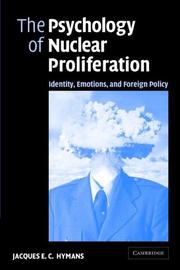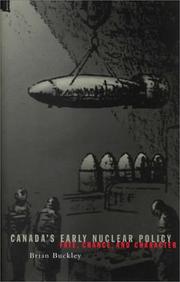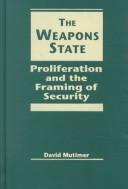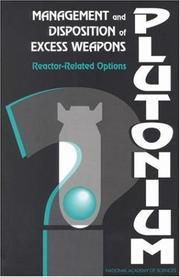| Listing 1 - 7 of 7 |
Sort by
|

ISBN: 9780521616256 9780521850766 0521850762 9780511491412 0511491417 0511146906 9780511146909 0511145888 9780511145889 0511146329 9780511146329 1280431563 9781280431562 9786610431564 6610431566 0521616255 0521616255 0511312490 9780511312496 1107153727 9781107153721 051118400X Year: 2006 Publisher: Cambridge New York Cambridge University Press
Abstract | Keywords | Export | Availability | Bookmark
 Loading...
Loading...Choose an application
- Reference Manager
- EndNote
- RefWorks (Direct export to RefWorks)
Dozens of states have long been capable of acquiring nuclear weapons, yet only a few have actually done so. Jacques E. C. Hymans finds that the key to this surprising historical pattern lies not in externally imposed constraints, but rather in state leaders' conceptions of the national identity. Synthesizing a wide range of scholarship from the humanities and social sciences to experimental psychology and neuroscience, Hymans builds a rigorous model of decisionmaking that links identity to emotions and ultimately to nuclear policy choices. Exhaustively researched case studies of France, India, Argentina, and Australia - two that got the bomb and two that abstained - demonstrate the value of this model while debunking common myths. This book will be invaluable to policymakers and concerned citizens who are frustrated with the frequent misjudgments of states' nuclear ambitions, and to scholars who seek a better understanding of how leaders make big foreign policy decisions.
International relations. Foreign policy --- Polemology --- Nuclear warfare --- Nuclear arms control --- Guerre nucléaire --- Armes nucléaires --- Contrôle --- Guerre nucléaire --- Armes nucléaires --- Contrôle --- Nuclear nonproliferation --- International relations --- Export of nuclear materials --- Export of nuclear technology --- International control of nuclear energy --- Nonproliferation, Nuclear --- Nuclear energy --- Nuclear exports --- Nuclear proliferation --- Proliferation, Nuclear --- Nuclear-weapon-free zones --- Political psychology --- Government policy. --- Psychological aspects. --- International control --- Social Sciences --- Political Science

ISBN: 1282858807 9786612858802 0773568611 9780773568617 0773520775 9780773520776 Year: 2000 Publisher: Montreal Kingston London Ithaca
Abstract | Keywords | Export | Availability | Bookmark
 Loading...
Loading...Choose an application
- Reference Manager
- EndNote
- RefWorks (Direct export to RefWorks)
In Canada's Early Nuclear Policy Brian Buckley weaves information from a number of disciplines to shed new light on Canada's early policies. Filling a longstanding gap in the national story, he explores the country's role in the early post-war period, cautioning against simplistic explanations and pointing to the continuing roles of contingency and personality in decision making. While the threat of nuclear war has receded in recent years, the number of states with nuclear weapons, the number of weapons, and their killing power are all far greater than they were five decades ago. Virtually all the issues that emerged fifty years ago remain on the international agenda and are as relevant today as ever.
Nuclear weapons --- Nuclear energy --- Armes nucléaires --- Énergie nucléaire --- Atomic energy --- Atomic power --- Energy, Atomic --- Energy, Nuclear --- Nuclear power --- Power, Atomic --- Power, Nuclear --- Force and energy --- Nuclear physics --- Power resources --- Nuclear engineering --- Nuclear facilities --- Nuclear power plants --- Atomic weapons --- Fusion weapons --- Thermonuclear weapons --- Weapons of mass destruction --- No first use (Nuclear strategy) --- Nuclear arms control --- Nuclear disarmament --- Nuclear warfare --- Government policy --- Politique gouvernementale --- Canada --- Military policy. --- Foreign relations --- Politique militaire. --- Relations extérieures --- Armes nucleaires --- Energie nucleaire --- Relations exterieures

ISBN: 1555877877 9781555877873 1588269663 9781588269669 Year: 2000 Publisher: Boulder, Colo. Rienner
Abstract | Keywords | Export | Availability | Bookmark
 Loading...
Loading...Choose an application
- Reference Manager
- EndNote
- RefWorks (Direct export to RefWorks)
The proliferation of all kinds of weapons (nuclear, chemical, biological, and even conventional) is emerging as a focal point for international security. This book shows how both the language used to talk about weapons proliferation and the practices adopted to respond to it serve to define the problem in ways that promote policy responses doomed to failure. Examining the metaphors that have been gathered into the proliferation discourse—in terms of the nature of the problems they construct, the various interests they create, and the identity of the actors that are constituted—Mutimer makes a seminal contribution to both critical IR and policy debates.
Polemology --- Nuclear nonproliferation. --- Nuclear arms control. --- Biological arms control. --- Chemical arms control. --- Security, International. --- Non-prolifération nucléaire --- Armes nucléaires --- Armes biologiques --- Armes chimiques --- Sécurité internationale --- Contrôle --- Non-prolifération nucléaire --- Armes nucléaires --- Sécurité internationale --- Contrôle --- Collective security --- International security --- Chemical weapons control --- Biological weapons control --- Nuclear weapons control --- Export of nuclear materials --- Export of nuclear technology --- International control of nuclear energy --- Nonproliferation, Nuclear --- Nuclear energy --- Nuclear exports --- Nuclear proliferation --- Proliferation, Nuclear --- International control --- International relations --- Disarmament --- International organization --- Peace --- Arms control --- Nuclear weapons --- Nuclear arms control --- Nuclear-weapon-free zones

ISBN: 0309051452 9786610193516 1280193514 0309587379 0585025401 9780585025407 9780309051453 0309050421 9780309050425 9786612081088 128208108X 0309586569 058503205X 9780585032054 9781280193514 6610193517 9780309587372 Year: 1994 Publisher: Washington, DC National Academy Press
Abstract | Keywords | Export | Availability | Bookmark
 Loading...
Loading...Choose an application
- Reference Manager
- EndNote
- RefWorks (Direct export to RefWorks)
Radioactive waste disposal --- Nuclear weapons --- Surplus military property --- Déchets radioactifs --- Armes nucléaires --- Surplus de matériel militaire --- Management. --- Environmental aspects --- Management --- Elimination --- Gestion --- Aspect de l'environnement --- Nuclear weapons - Environmental aspects - United States. --- Plutonium --- Civil & Environmental Engineering --- Engineering & Applied Sciences --- Environmental Engineering --- Isotopes --- Isotopes. --- Déchets radioactifs --- Armes nucléaires --- Surplus de matériel militaire --- Military surpluses --- War material, Surplus --- War surpluses --- Atomic weapons --- Fusion weapons --- Thermonuclear weapons --- Nuclear waste disposal --- Military supplies --- Surplus government property --- Weapons of mass destruction --- No first use (Nuclear strategy) --- Nuclear arms control --- Nuclear disarmament --- Nuclear warfare --- Nuclear fuels --- Nuclear engineering --- Radioactivity --- Refuse and refuse disposal --- Radioactive pollution --- Safety measures --- Nuclear weapons plants --- 800 Collectie Vlaams Vredesinstituut --- 820 Internationale Betrekkingen --- 830 Economie --- 835 Natuurlijke rijkdommen --- 838.1 Ecologie --- 870 Defensie en Wapens --- 873 Wapenbeheersing --- 876 Veiligheidspolitiek --- 882.4 Noord-Amerika --- 884.1 Oost-Europa
Book
ISBN: 1501764403 1501765019 1501764411 150176442X Year: 2022 Publisher: Ithaca [New York] : Cornell University Press,
Abstract | Keywords | Export | Availability | Bookmark
 Loading...
Loading...Choose an application
- Reference Manager
- EndNote
- RefWorks (Direct export to RefWorks)
"This book is a study of India's nuclear program (1940s-1980s) through its global partnerships with governments and businesses, its close association with the space program, its anti-nonproliferation stance during most of the Cold War, and the intermestic territorial threats that influenced its unique outcomes"-
Technology and state. --- Nuclear weapons --- Nuclear weapons. --- Nuclear energy --- Nuclear energy. --- Diplomatic relations. --- Politique scientifique et technique --- Armes nucleaires --- Énergie nucleaire --- Technology and state --- Government policy. --- Histoire --- Politique gouvernementale --- History --- Government policy --- India. --- Inde --- India --- Relations exterieures --- Foreign relations --- Atomic energy --- Atomic power --- Energy, Atomic --- Energy, Nuclear --- Nuclear power --- Power, Atomic --- Power, Nuclear --- Force and energy --- Nuclear physics --- Power resources --- Nuclear engineering --- Nuclear facilities --- Nuclear power plants --- Atomic weapons --- Fusion weapons --- Thermonuclear weapons --- Weapons of mass destruction --- No first use (Nuclear strategy) --- Nuclear arms control --- Nuclear disarmament --- Nuclear warfare --- State and technology --- Technology --- Endowment of research --- Science and state --- Relations --- Atomic energy policy --- Bharat --- Bhārata --- Government of India --- Ḣindiston Respublikasi --- Indi --- Indien --- Indii͡ --- Indland --- Indo --- Republic of India --- Sāthāranarat ʻIndīa --- Yin-tu --- ploughshare loophole, anti-dissent machine, pokhran sikkim, reagan administration nuclear weapons, India's space program, india nuclear weapons.
Book
ISBN: 9780228013266 0228013267 Year: 2022 Publisher: Montreal Kingston London Chicago
Abstract | Keywords | Export | Availability | Bookmark
 Loading...
Loading...Choose an application
- Reference Manager
- EndNote
- RefWorks (Direct export to RefWorks)
A critical reflection on the potential of nuclear humanities, Toxic Immanence offers intellectual strategies for resisting and abolishing the global nuclear regime. This collection develops a discourse between the fields of nuclear knowledge and integrates the nuclear humanities with environmental justice and Indigenous rights activism and arts.
Nuclear weapons. --- Armes nucléaires. --- Nuclear accidents --- Accidents nucléaires --- Nuclear energy --- Énergie nucléaire --- Geopolitics. --- Géopolitique. --- Radioactive wastes. --- Déchets radioactifs. --- Art and nuclear warfare. --- Social aspects. --- Aspect social. --- Allen Ginsberg. --- Anthropocene. --- Australian aborigenes. --- Britain. --- Chernobyl. --- Cold War. --- Dreamtime. --- Fukushima. --- Glenn Canyon. --- Great Bear Lake Dene. --- Hiroshima. --- IAEA. --- Kazakhstan. --- Manhattan project. --- Maralinga. --- Marshall Islands. --- Media. --- Semipalatinsk Test Site. --- Shin Godzilla. --- Undone. --- accident. --- alterlife. --- archeology. --- atomic age. --- biopolitics. --- climate emergency. --- colonialism. --- decolonizing. --- disaster. --- downwinders. --- ecocriticism. --- enduring. --- energy. --- environmental. --- fallout. --- fiction. --- fusion. --- hibakusha. --- humanities. --- immanence. --- indigenous. --- necropolitics. --- nuclear-free. --- nuclear. --- pedagogies. --- politics. --- post-apocalyptic. --- power. --- radiation. --- science. --- seismic. --- sovereignty. --- tests. --- uranium. --- waste. --- weapons. --- zone. --- Armes nucléaires. --- Accidents nucléaires --- Énergie nucléaire --- Géopolitique. --- Déchets radioactifs.
Book
ISBN: 9780739148624 9780739148648 0739148648 0739148621 1282921959 9781282921955 9786612921957 6612921951 Year: 2011 Publisher: Lanham, Md. Lexington Books
Abstract | Keywords | Export | Availability | Bookmark
 Loading...
Loading...Choose an application
- Reference Manager
- EndNote
- RefWorks (Direct export to RefWorks)
Threat does not inherently matter unless it is perceived, and, on the other hand, anything that is perceived as threat matters, whether or not the threat rings true. North Korean Foreign Policy: Security Dilemma and Succession, by Yongho Kim, posits security dilemma and political succession as the two main factors that North Korea perceives as threat, and that these external and domestic threats constitute Pyongyang's provocative foreign policy. North Korean Foreign Policy suggests that an effective policy for countries relating to North Korea, whether dovish or hawkish, should deal directly w
National security --- Heads of state --- Nuclear weapons --- Sécurité nationale --- Chefs d'Etat --- Armes nucléaires --- Succession --- Government policy --- Politique gouvernementale --- Korea (North) --- Corée du Nord --- Foreign relations --- Politics and government --- Relations extérieures --- Politique et gouvernement --- K9560 --- K9500.90 --- -Korea (North) --- -National security --- -Heads of state --- -Nuclear weapons --- -Atomic weapons --- Fusion weapons --- Thermonuclear weapons --- Weapons of mass destruction --- No first use (Nuclear strategy) --- Nuclear arms control --- Nuclear disarmament --- Nuclear warfare --- Heads of government --- Rulers --- State, Heads of --- Executive power --- Statesmen --- National security policy --- NSP (National security policy) --- Security policy, National --- Economic policy --- International relations --- Military policy --- Korea: International politics, law and relations of North Korea -- general, world and transregional --- Korea: Politics -- history -- North Korea (1945- ) --- -20th century --- -21st century --- -Politics and government --- -Government policy --- -Korea: International politics, law and relations of North Korea -- general, world and transregional --- -K9560 --- Atomic weapons --- Sécurité nationale --- Armes nucléaires --- Corée du Nord --- Relations extérieures --- Korean People's Republic --- People's Democratic Republic of Korea --- Koreĭskai︠a︡ Narodno-Demokraticheskai︠a︡ Respublika --- Korea (North Korean Government) --- Democratic People's Republic of Korea --- North Korea --- KNDR --- Chʻao-hsien min chu chu i jen min kung ho kuo --- Koreai Népi Demokratikus Köztársaság --- Korea (Democratic People's Republic) --- K.N.D.R. --- K.R.L.D. --- Korea (People's Democratic Republic) --- Korean People's Democratic Republic --- Chōsen Minshu Shugi Jinmin Kyōwakoku --- Chosŏn Minjujuŭi Inmin Konghwaguk --- KRLD --- Koreańska Republika Ludowo-Demokratyczna --- Kūriyā al-Dīmuqrāṭīyah --- D.P.R.K. --- DPRK --- República Popular Democrática de Corea --- Corea (North) --- North Korean Interim Government --- Chosun Minchu-chui Inmin Konghwa-guk --- Foreign relations. --- Chaoxian minzhu zhuyi renmin gongheguo --- 朝鲜民主主义人民共和国
| Listing 1 - 7 of 7 |
Sort by
|

 Search
Search Feedback
Feedback About UniCat
About UniCat  Help
Help News
News